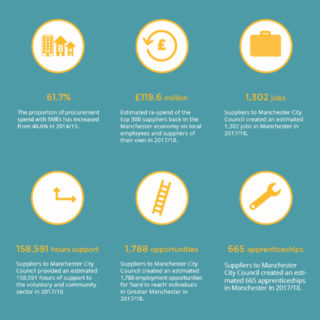From policy to practice; how Social Value can change lives in Manchester
In the last decade, Social Value has gone from unknown and untested to the flavour of the month. Here Jonty and Matthew reflect on Manchester’s early adoption of socially-minded procurement, its impact to date and its role going forward.
The idea that when local authorities buy goods and services they should ensure that the money given to suppliers produces good social, economic, and environmental outcomes might now seem like common sense, but ten years ago there was no Social Value Policy Act and very little activity around of this nature.
Manchester’s early adoption of social value
One of the earliest adopters of the social value informed approach to buying goods and services was Manchester City Council (MCC), with whom the Centre for Local Economic Strategies (CLES) began working on progressive procurement in 2008. Together, MCC and CLES have worked to replace the traditional approach to procurement with its narrow focus on price, with a more socially-minded one, in which the wider social impact of how we spend the ‘democratic pound’ is considered alongside cost and quality. This has mainly involved working closely with procurement and commissioning teams to gradually embed social value at all stages of the procurement lifecycle. MCC have undertaken a series of initiatives such as: implementing an ethical procurement policy, engaging with suppliers in areas of deprivation, and weighting social value in the tender process (currently at 20%). More information about the work over ten years can be found here.
Has it really made any difference?
Now, the question is: has any of this work had real, tangible outcomes on the lives of the good citizens of Manchester? As a think and do tank, CLES has always been concerned with the real, on the ground impact of public policy work. Strategic reviews and strategies are well and good, but what really matters is what difference it makes to local people and places. With social value, the question is simple; behind the numbers, have the lives of ordinary people been changed by this new approach to procurement spend?
This was the question asked at our third annual Social Value conference, held with Manchester City Council at the Manchester Friends Meeting House on Tuesday 12th February. Chaired by Cllr Carl Ollerhead (Executive member for Finance and Human Resources) and organised by CLES, the event brought together over one hundred people; from commissioners and Council officials, to suppliers and buyers, as well as many from other areas who wanted to learn from Manchester’s best practice.
Over the day, participants heard from various speakers about how Manchester City Council’s Social Value approach to procurement and commissioning is now baring tangible outcomes for real people in Manchester. We heard from various speakers such as Hera Hussain of Open Data Manchester; Anne Lythgoe from the Greater Manchester Social Value Network; Nicki Thomson & Jonathan Felce of Barclays; and many more. Taken together, the speakers mapped out how the application of social value in procurement and commissioning is now sufficiently mature to the extent that it is having a real impact.
What CLES’ analysis reveals
CLES also presented research on the impact of changes to procurement spend. Our analysis from 2017/18 found that £307 million out of a total spend of £430.7 million (with the top 300 suppliers by value of spend) was spent with Manchester based suppliers, a proportionate rise of over 20 percentage points since work began in 2008/08.
The proportion of spend within the local economy does not produce local social, economic and economic outcomes for local communities in and of itself. A supplier might be local, but it can only be said to be adding social value if it is producing real, substantive outcomes for local people; good employment, training, skills and development. That is why we at CLES also presented our findings on the wider impact of this procurement work (gathered through a survey of the supply chain), in which we found:

Throughout the day, the impact demonstrated by these figures came to life in an animated and real way. Changing procurement and commissioning practices might sound like a dry subject, but events such as the Social Value conference demonstrate that when these policies and strategies actually make the transition from policy to practice, the outcomes are there to be seen.
The conference also sought to provide a practical element, with a series of workshops on topics such as ‘The power of procurement’ or ‘Practical ways of embedding social value at each stage of the procurement cycle’. These allowed attendees to discuss the main ideas presented on the day, as well as deliberate on their own plans for the future.
Overall, the conference was a successful reflection on the excellent work being done not only by Manchester City Council, but more broadly by the wide variety of suppliers and suppliers-of-suppliers who have taken up the call of embedding Social Value to the heart of their organisational objectives.
Moving forward
CLES has long argued that all public sector suppliers should hold core ‘Public Values’, and that these values make all sorts of organisations want to act in ways that help transform the lives of local citizens. The work demonstrated at the conference was proof that Manchester’s suppliers are ready and willing to take on the challenge. As closing speaker, Matthew Baqueriza-Jackson commented that the work so far has been inspiring, but there is still more work to do.
Social value has come a long way in the last ten years, but now is the time to deepen the impact, further embed social value into local government, and find new ways of making good local economies. On the evidence presented last week, Manchester is the place where this can happen.



